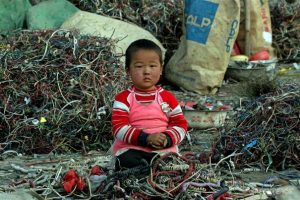
The electronics industry today is defined by rapid technology change and continuous product innovation which causes consumers to have short periods of satisfaction and results in the industry engaging in planned obsolescence. These characteristics have resulted in increasing amounts of electronic waste around the globe.
One area of the world that is of great concern is East and South East Asia. In this region, the volume of discarded electronic waste increased 63% between 2010 and 2015.
Electronic goods, such as computers, TV’s and phones contain materials which, when placed in a landfill pose a threat to drinking water and may result in other environmental hazards in the future. As the world’s fastest-growing solid waste stream, the handling of end-of-life (EOL) electronic products has drawn global attention.
In Asia, not only is there an increase in the volume of waste, but there is also improper and illegal e-waste dumping prevalent in most of the countries. Asia is behind the times for sustainable waste management but the illegal and improper dumping is partially due to the lack of suitable disposal sites.
This leads me to the good new, which is, many of the materials in electronic goods are recyclable. Although the problem of e-waste might be incredibly disconcerting I see it as a business opportunity. If e-waste is properly disposed of and is sent to recycling facilities, valuable materials can be extracted to then be re-used in other goods.
For example, in the US approximately 150 million mobile phones are discarded each year. Up to 35,000 pounds of copper and 772 pounds of silver can be recovered per 1 million devices recycled, alongside marginal gold and palladium extraction.
Without taking sustainability into consideration it would be difficult for anyone to conceptualize the riches that can come from “garbage”. But with an understanding of sustanability framework, such as the circular economy, it becomes apparent how beneficial a program like this could be for every aspect of the triple bottom line.